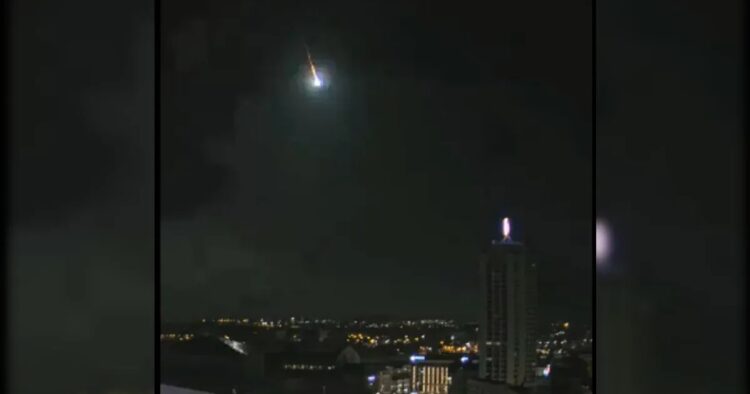In a breathtaking celestial display, a small asteroid entered Earth’s atmosphere on Sunday morning, casting a vibrant glow across the sky over eastern Germany. Videos capturing the mesmerizing descent of the celestial object flooded social media platforms, showcasing a celestial event that caught the attention of sky gazers in Europe. The initial sighting of the asteroid was credited to Hungarian researcher Krisztian Sarneczky, a self-proclaimed “asteroid hunter,” who spotted the celestial visitor from an observatory in Hungary.
Experts later confirmed that the luminous spectacle was the result of a disintegrating meteorite, adding to the allure of the cosmic event. The asteroid, temporarily designated 2024 BX1 or Sar2736, made its final descent outside Berlin near Nennhausen around 1:30 am, leaving astronomers and observers in awe.
Social Media Buzz as Onlookers Capture the Celestial Phenomenon
The remarkable event did not go unnoticed, as onlookers excitedly shared their first-hand experiences on social media platforms. Videos depicting the space rock’s journey as it illuminated the night sky flooded timelines, providing a glimpse of the rare spectacle. Denis Vida, a PhD associate in meteor physics at Western University in Canada and founder of the Global Meteor Project, shared a video capturing the asteroid’s breakup about 50 kilometers west of Berlin. Spectators marveled at the celestial display, with some sharing their views from Prague, further enhancing the global perspective of this cosmic event.
Here's the full video of the asteroid #Sar2736, a ~1 m object that broke up some 50 m west of #Belin, #Germany, and probably dropped some meteorites on the ground. Video credit: https://t.co/72o6ZzPNz8 pic.twitter.com/PA73dkqid1
— Denis Vida (@meteordoc) January 21, 2024
NASA’s Confirmation and Timely Warning
The United States space agency NASA played a crucial role in the incident, confirming the asteroid’s disintegration approximately 20 minutes before impact. In a proactive move, NASA issued a public advisory, notifying the public of the harmless nature of the event and assuring observers that the disintegrating asteroid would manifest as a harmless fireball near Nennhausen, west of Berlin. This timely communication allowed skywatchers to prepare for the event and contributed to the widespread documentation of the celestial phenomenon.
Insights from Experts and Unique Achievements
Denis Vida, the meteor physics expert, shared insights into the event, suggesting that the asteroid likely dropped meteorites on the ground as it traversed the Earth’s atmosphere and disintegrated. This incident marked the eighth time an asteroid has been discovered before impacting Earth, highlighting the growing capabilities of astronomers and space enthusiasts in tracking celestial objects. Krisztian Sarneczky, the Hungarian “asteroid hunter,” earned distinction by making his third such discovery. His previous findings include a space rock that struck north of Iceland in 2022 and another that exploded over the English Channel during last year’s Super Bowl.
Prague's view of #Sar2736: a minor planet entering Earth's atmosphere on Jan 21, 2024, at 00:32 UT. pic.twitter.com/KXDnBvzmGX
— Hanjie Tan (@HonkitTan) January 21, 2024
Looking Ahead: Potential Future Collisions
While the recent event brought awe and excitement, discussions also turned to potential future celestial encounters. Notably, the next possible dangerous collision might occur in 2182, with a 1 in 2,700 chance of a small near-Earth asteroid named Bennu penetrating the Earth’s atmosphere. This reminder underscores the ongoing importance of monitoring and understanding celestial bodies to safeguard our planet from potential cosmic impacts.

















Comments